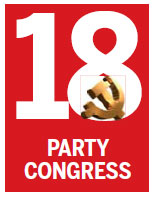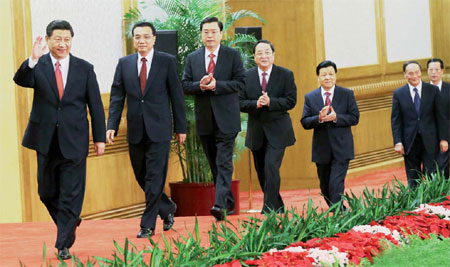Party unveils new leadership
Updated: 2012-11-16 08:49
By Hu Yuanyuan (China Daily)
|
||||||||
|
The newly-elected members of the Standing Committee of the Political Bureau of the CPC Central Committee, (from left) Xi Jinping, Li Keqiang, Zhang Dejiang, Yu Zhengsheng, Liu Yunshan, Wang Qishan and Zhang Gaoli, arrive to meet the press in Beijing after the election on Nov 15. Xu Jingxing / China Daily |

General secretary pledges to strive for better overall living standards, closer ties with people
Vowing not to rest on past laurels, the new leadership of the Communist Party of China has promised to take decisive steps to end corruption, improve living standards, forge closer links with people and continue with reforms.
In the leadership changes that were announced on Nov 15, Xi Jinping was appointed general secretary of the CPC Central Committee and chairman of the CPC Central Military Commission.
"To fulfill our responsibility, we will rally and lead the whole Party and the people of all ethnic groups in China in making continued efforts to free up our minds, carry out reform and opening-up, further release and develop the productive forces, work hard to resolve the difficulties the people face in both work and life, and unwaveringly pursue common prosperity," Xi said.
Besides Xi, the other members of the newly elected Standing Committee of the Political Bureau of the CPC Central Committee are Li Keqiang, Zhang Dejiang, Yu Zhengsheng, Liu Yunshan, Wang Qishan, and Zhang Gaoli.
According to Xi, the Party faces many serious challenges, and there are also many pressing problems within the Party such as corruption, being divorced from the people, going through formalities and bureaucratism caused by some Party officials.
"We must make every effort to solve these problems. The whole Party must stay on full alert," Xi said.
The new leadership's decision to press ahead with reforms is in accordance with the report delivered by President Hu Jintao on behalf of the 17th CPC Central Committee.
Hu pointed out that "deepening reforms" is the key to transforming the economic growth model, and "how to balance the relationship between the government and the market" is the key to reforms.
"We should consolidate and develop the public sector of the economy, allow public ownership to take diverse forms, deepen the reform of state-owned enterprises, improve the mechanisms for managing all types of state assets and invest more state capital in key fields that comprise the lifeline of the economy and are vital to national security," Hu said.
"The statements reflect the government's determination to continue with reforms," said Wang Haifeng, director of international economics at the Institute for International Economic Research, a think tank under the National Development and Reform Commission.
Wang said that building a well-off society would include doubling the GDP and per capita GDP by 2020 as well as expanding democracy.
"The target of doubling the GDP by 2020 can probably be achieved in 2018 or 2019, given the current economic growth rate," says Wang. "We estimate the per capita in the major cities along the coastal regions will reach $20,000 (15,700 euros) by 2020 and about $7,000 in the inland and rural areas."
Expanding democracy and promoting mass initiatives will go a long way in bolstering the economic development in the inland regions, he said.
Chen Yixin, Party secretary of Jinhua, a city in Zhejiang province, said that the new leadership should also consider stepping up reforms that have already begun in certain sectors.
"We have some comprehensive reform zones such as Shenzhen, Pudong and Tianjin Binhai. We need the reforms to encompass other sectors," Chen said, adding that the government should also consider setting up an international trade zone.
China's export growth has largely slowed this year due to a sluggish global economy and the debt crisis in the EU. However, Yiwu - which is administered by Jinhua - known as the marketplace of the world, reported a 59.1 percent increase in exports during the first nine months of the year and looks on track to end the full year with growth of more than 80 percent.
"We want Yiwu to be an international trade special zone and will submit the transformation plan for government approval soon," Chen said.
China must also implement a "more proactive" opening-up strategy, including focusing on both exports and imports, creating new advantages for Chinese exports, enhancing the quality of foreign direct investment and encouraging domestic companies to accelerate the pace of their outbound investment, Hu said in his report.
According to Wei Jianguo, former vice-minister of commerce, the government considers both exports and imports crucial to the national economy.
"The national strategy will focus on raising imports, and it is likely that policies in this regard may be announced soon," Wei said. "The government may also consider a separate fair for imports in Shanghai, Shenzhen or Tianjin, on the lines of the Canton Fair in Guangzhou."
As part of this strategy, China should encourage more imports of high-tech equipment, luxury goods and daily necessities, he said. Strengthening regional and sub-regional cooperation is also a major part of this plan, Wei said.
"There are also indications that the government will take more proactive steps to sign free trade agreements, especially with African countries," Wei said.
Xinhua contributed to this story.
huyuanyuan@chinadaily.com.cn
(China Daily 11/16/2012 page3)

 Relief reaches isolated village
Relief reaches isolated village
 Rainfall poses new threats to quake-hit region
Rainfall poses new threats to quake-hit region
 Funerals begin for Boston bombing victims
Funerals begin for Boston bombing victims
 Quake takeaway from China's Air Force
Quake takeaway from China's Air Force
 Obama celebrates young inventors at science fair
Obama celebrates young inventors at science fair
 Earth Day marked around the world
Earth Day marked around the world
 Volunteer team helping students find sense of normalcy
Volunteer team helping students find sense of normalcy
 Ethnic groups quick to join rescue efforts
Ethnic groups quick to join rescue efforts
Most Viewed
Editor's Picks

|

|

|

|

|

|
Today's Top News
Chinese fleet drives out Japan's boats from Diaoyu
Health new priority for quake zone
Inspired by Guan, more Chinese pick up golf
Russia criticizes US reports on human rights
China, ROK criticize visits to shrine
Sino-US shared interests emphasized
China 'aims to share its dream with world'
Chinese president appoints 5 new ambassadors
US Weekly

|

|







